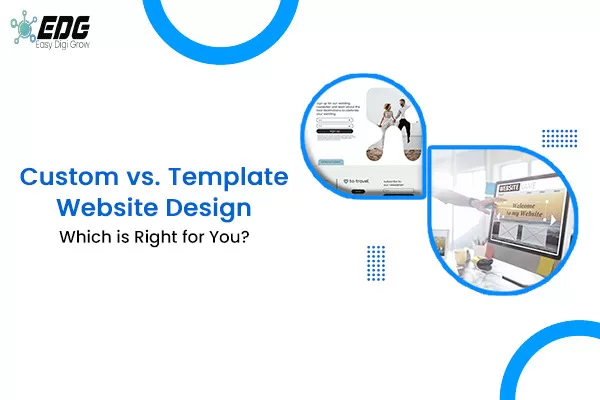Welcome to the dynamic world of website design, where the digital landscape becomes a stage for creativity and innovation. A well-designed website plays a critical role in attracting and engaging customers. When it comes to website design, two primary options are available: custom design and template design. Both approaches have their own merits and considerations.
In this blog, we will explore the differences between Custom and Template Website Design and help you determine which option best suits your needs.
Custom Website Design
Custom website design means building a website completely from scratch to fit the specific needs of a business. It entails hiring a professional web design company or agency like EasyDigiGrow to design and develop a website that aligns with the company’s brand identity, goals, and target audience.
Examples of Successful Custom Websites
MakeMyTrip
Its custom website design offers seamless navigation, personalized travel recommendations, and a secure booking process for flights, hotels, and holiday packages.
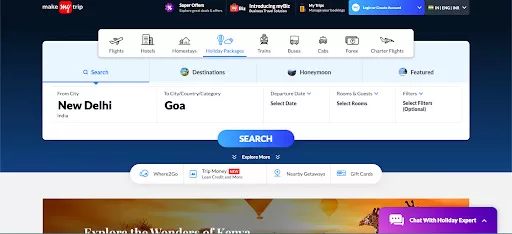
Image Courtesy: Makemytrip
Zomato
Zomato is a renowned online food delivery and restaurant discovery platform in India. Its custom website design features intuitive search functionality, comprehensive restaurant listings, user reviews, and online ordering capabilities.
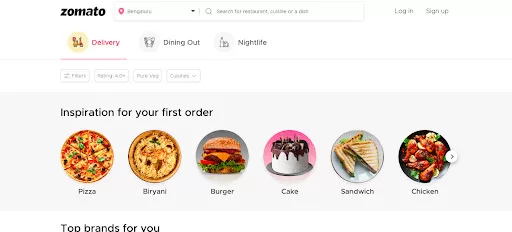
Image Courtesy: Zomato
Nykaa
Nykaa is a popular beauty and cosmetics e-commerce platform in India. Its custom e-commerce website design showcases a wide range of beauty products, offers personalized recommendations, and ensures a smooth checkout process.

Image Courtesy: Nykaa
Pros
- Unique and Tailored Design: Create a unique and visually appealing website that sets your brand apart from the competition. You have complete control over the layout, color scheme, typography, and overall aesthetics.
- Enhanced Functionality: Flexibility in terms of functionality and features and you can integrate advanced functionalities such as e-commerce capabilities, custom forms, and user-friendly interfaces to provide a seamless user experience.
- Scalability and Growth: As your business evolves and expands, a custom design allows for easy integration of new features and functionalities. You can adapt your website to meet the changing needs of your business and your audience.
- Optimized for Search Engines: Custom website design enables you to implement proper SEO strategies from the ground up. By optimizing your website’s structure, headings, and content, you can drive organic traffic.
Cons
- Cost and Time: The process involves initial consultations, multiple design iterations, and development from scratch. The cost and timeline may vary depending on the complexity of your requirements.
- Expertise and Maintenance: Custom websites often require ongoing maintenance and updates. You may need to rely on web development professionals to implement changes, fix issues, and ensure the website’s security and performance.
Bonus web design guide: Top 20 Website Design Trends to Stay Ahead of the Game
Template Website Design
Template website design involves using pre-designed website templates that can be customized to fit your brand and content. These templates are created by professional designers and are readily available for purchase or download from various online platforms.
Examples of Successful Template Websites
Etsy:
The website employs a template design that allows sellers to create their own online shops with customizable layouts, product listings, and branding elements to showcase their unique offerings.
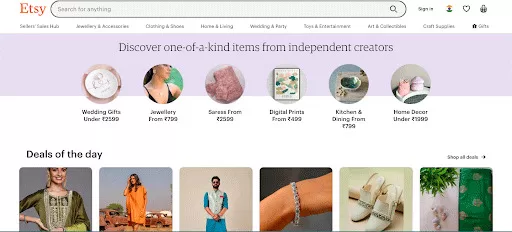
Image Courtesy: Etsy
TED:
The website incorporates a template design that showcases videos, speaker profiles, and event information in a visually appealing and user-friendly format. The use of templates enables TED to maintain a cohesive and professional online presence.

Image Courtesy: Ted
Medium:
The website employs a template design that provides a clean and readable layout for written content. The use of templates allows writers to focus on their content while ensuring a consistent and aesthetically pleasing presentation for readers.

Image Courtesy: Medium
Pros
- Cost-Effectiveness: The templates themselves are often competitively priced, and you can save on design and development costs by customizing the chosen template according to your needs.
- Quick Deployment: They are pre-built, and all you need to do is customize the content and branding elements. This is particularly beneficial if you have a tight deadline or need to launch a basic website swiftly.
- Ease of Use: Templates are designed to be user-friendly, even for individuals with minimal technical expertise. They often come with CMS that allows you to update and manage your website without extensive coding knowledge.
- Support and Updates: Many template providers offer ongoing support and regular updates to ensure the security and compatibility of their templates. This saves you time and effort in keeping your website up to date.
Cons
- Limited Customization: While templates can be customized to match your brand, they come with certain limitations. You may not have complete control over the layout, and your website may look similar to other sites using the same template.
- Less Flexibility: Template designs are built to cater to a wide range of industries and purposes. This means that some specific functionalities or design elements you require may not be readily available in the chosen template.
Check out our guide on the role of visuals in web design for a better user experience.
Custom vs. Template Website Design: A Comparison
To help you visualize the differences between custom and template website design, let’s compare them side by side in a table:
| Custom Website Design | Template Website Design | |
| Design | Unique and tailored to your brand | Limited customization options |
| Functionality | Fully customizable with advanced features | Pre-built features with limited customization |
| Scalability | Easily adaptable to growth and changing needs | May require additional customization for scale |
| SEO Optimization | Can implement tailored SEO strategies | Requires optimization within template limits |
| Cost | Higher upfront investment and ongoing maintenance | More affordable upfront with lower maintenance |
| Time | Longer development time | Quick deployment |
| Expertise Required | Professional web designer or agency | Minimal technical expertise required |
Conclusion
Choosing between Custom and Template Website Design depends on your specific needs, budget, timeline, and long-term goals. EasyDigiGrow stands out as one of the best web design companies in India for custom website design. We have a professional team of designers who create tailor-made websites aligned with clients’ unique requirements.
Ultimately, the choice between custom and template website design depends on your priorities and resources. Consider your budget, desired level of customization, scalability, and long-term goals to make an informed decision that aligns with your business needs.
FREQUENTLY ASKED QUESTIONS
- What factors should I consider when choosing between custom and template website design?
Factors such as budget, timeline, desired level of customization, scalability, and long-term goals should influence your decision.
- Can I switch from a template website to a custom website in the future?
Yes, it is possible to switch from a template website to a custom design later on, although it may require additional work such as redesigning and migrating content.
- Will a custom website give me an advantage in search engine rankings?
While a custom website provides the opportunity for better search engine optimization, SEO involves various factors beyond design alone.
- Can I modify a template website to make it look unique?
Yes, you can customize a template website to make it more unique and reflective of your brand, although the extent of customization may be limited compared to a custom design.
- Do template websites lack professionalism?
Template websites can still be professional and visually appealing if executed well. Choosing a high-quality template and customizing it appropriately can result in a professional-looking website.
- Which are the best web design companies in India for custom website design?
EasyDigiGrow stands out as one of the best web design companies in India for custom website design due to its expertise in creating tailor-made websites that align with clients’ unique requirements. We offer a professional team of designers, a proven track record of successful projects, and a commitment to delivering visually appealing and functional websites.
- How can I ensure a smooth transition from a template website to a custom design?
Thorough planning is essential. Conduct a comprehensive review of your current website’s functionalities and work closely with a professional web designer or agency to seamlessly integrate all aspects into the new custom design.
- What are some current custom website design trends in Delhi/NCR?
In Delhi/NCR, some popular custom website design trends include responsive and mobile-friendly designs, minimalist and clean aesthetics, immersive storytelling through visuals and videos, personalized user experiences, integration of interactive elements, and a focus on accessibility and inclusive design.
- Can template website designs be suitable for e-commerce businesses in India?
Yes, template website designs can be well-suited for e-commerce businesses in India. Many website builders and platforms offer e-commerce templates that provide a solid foundation for creating online stores. These templates often include features such as product listings, shopping carts, payment gateways, and order management systems, making it easier for businesses to set up and manage their e-commerce websites efficiently.
- What are some of the top template-based website builders available?
Popular template-based website builders include Wix, Squarespace, Weebly, WordPress, and Shopify. These platforms provide a variety of templates and customization options to suit different needs and preferences.[/vc_column_text][/vc_column][/vc_row]
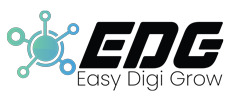 seolounge
seolounge